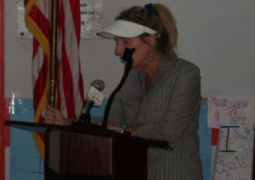
This is in line with the ministry of energy’s policy of providing clean and sustainable energy to all and the government blueprint document, the Programme of Accelerate Growth and Employment (PAGE), which are all geared towards reducing poverty.
Minister Sanneh was speaking during the opening ceremony of a five-day training of trainers on renewable energy expert held recently at the GTTI premises by the GEF/UNIDO 4 project in The Gambia.
The global economy and financial difficulties and challenges and a vibrant and reliable energy sector were the main catalyst to any meaningful and sustainable social-economic development for any nation and in particular developing nation, he said.
“It is salient to mention that no government can single-handedly finance and manage the whole energy sector without the direct involvement of the other key stakeholders, particularly the private sector,” said the energy minister.
In cognizance of the above, he said, the Government of The Gambia through the ministry of energy continues to create the enabling environment for private sector involvement in the energy sector, particularly the renewable energy subsector, through the provision of some incentives to project developers.
He said that some of these incentives include tax holidays and zero-tax on all imports for major renewable energy components meant for specific projects.
He said that currently the ministry of energy is working closely with all relevant stakeholders to review the list of renewable energy components that would benefit from zero tax on importation.
“My ministry strongly believes that when all these incentives are available to the project developers it would ease the financial burden on them and hence increase investment in renewable energy in The Gambia,” he said.
Energy sector and in particular the renewable energy could not develop sustainably without building the requisite capacities and skills to tackle “the numerous challenges that this sector faces” including proper design, installation and maintenance of the various renewable energy technologies.
He commended the GEF/UNIDO 4 project for attaching so much importance to capacity building and training on renewable energy prior to this training.
The GEF/UNIDO 4 project in collaboration with one of its demo projects, Mbolo Women Training Centre conducted training for 30 Gambians on design, installation and maintenance of standalone hybrid systems in 2012.
Speaking earlier, Mrs Ndey Bakurin, executive director of National Environment Agency (NEA) and chairperson of GEF/UNIDO project steering committee, said it was indeed a great pleasure to witness this training of trainers on renewable energy expert workshop organised by promoting renewable energy based mini-grids for productive uses in rural areas in The Gambia.
“The sustainable management of our environment and natural resources is the cornerstone for meaningful development, therefore a high priority area for our country,” he said.
She said the Government of The Gambia, in partnership with GEF and UNIDO, is implementing this important project and one of the key components of the project is capacity building, which includes training of trainers.
“The importance attached to this workshop is reflected by the turnout which has drawn members from the public institutions, NON-governmental organizations (NGOs), and the private sector,” she said.
She added that it was a matter of truth of claim that the workshop had come at the right time, as the world is in the era of sustainable energy and the project was a good contribution to it.
“The NEA works closely with all other stakeholders at all levels to address the environmental and sustainable development efforts needed,” she stated.
Mr Alois P. Mhlanga said the United Nations Industrial Development Organization (UNIDO) recruited an international consultant from the energy centre to conduct capacity need for assessment on renewable energy training and renewable energy curriculum development for tertiary institutions in The Gambia.




